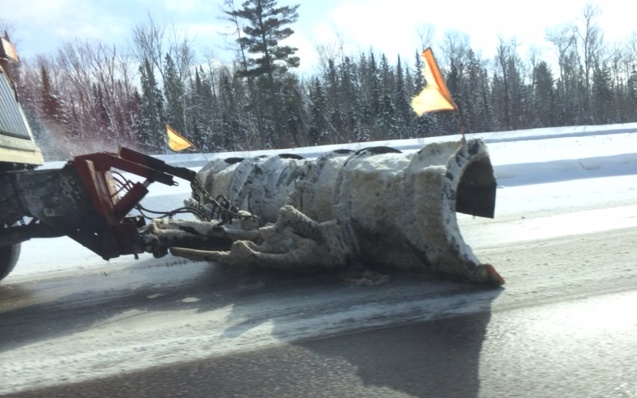 A lot of Ontario motorists face greater danger this past winter says Auditor General Bonnie Lysyk in a 43-page Special Report released today.
A lot of Ontario motorists face greater danger this past winter says Auditor General Bonnie Lysyk in a 43-page Special Report released today.
See the full report:
http://www.auditor.on.ca/en/reports_en/winterhighway_en.pdf
She says less safe winter highway conditions starting occurring after the province moved in 2009 to save money by contracting out winter road maintenance primarily to the lowest bidders—bidders that in many cases did not have sufficient equipment to do the work.
"Over the past five years, winter highway maintenance service levels have declined from the level that Ontarians have historically been used to," Lysyk said in the Report.
"The Ministry of Transportation has been successful in reducing and containing escalating winter maintenance costs, but the time it takes to clear highways during and after a storm, to make them as safe as possible for motorists in winter, has increased," Lysyk.
Nipissing MPP Vic Fedeli said in a news release that the report shows clear mismanagement.
“This report casts another disgraceful shadow on this Liberal government. Northerners, who drive on these highways every day, need to know that they don’t have to take their life in their hands when travelling with their families.
“The Ministry of Transportation should be ashamed of their complete disregard for the safety of Northern Ontarians.” Fedeli added, “This is a government who knowingly risks people’s lives, all to save a few dollars.”
In 2009/10, the most traveled highways in the province were cleared to achieve bare pavement, on average, in 2.1 hours after the end of a storm; this increased to an average of 4.7 hours after the end of a storm in the winter of 2013/14. Further, six of 20 contract areas did not even meet the province's standard of clearing the most traveled highways within eight hours 90% of the time (a generous standard when compared to other jurisdictions).
In 2009, a significant change was made in the method of contracting for winter highway maintenance work when the province moved to "performance-based" contracts. These contracts gave contractors full autonomy in determining how they would get the work done. The province primarily chose contractors on the basis of the lowest price bid (versus selecting a contractor based on cost and ability to provide the expected level of services).
Among the Report's other findings:
- Even though ministry staff, including engineers, raised serious concerns during the procurement process for performance-based contracts that the majority of winning contractors would not be able to meet their winter maintenance commitments because of insufficient equipment, these lowest-price contractors were still awarded the contracts. Contractors assured the Ministry that they would be able to meet the contract commitments. However, in many cases, this was not the case.
- In one case that the lowest bidder actually ended up costing more than the next-highest bidder because the province had to step in and pay for more equipment to clear roads properly. If the next-highest bidder had been procured, the area could have been serviced with more equipment at a lower cost.
- Contractors under performance-based contracts used less highway treatment materials such as anti-icing liquid, sand and salt to service highways, resulting in less safe highways. In one contract area, anti-icing-liquid use over the winter season went from an average of 3.2 million litres under the original area maintenance contract to 9,500 litres in the first year of the performance-based contract.
- Patrolling to determine road conditions was no longer required to be conducted daily by contractors; instead, contractors were to "be aware" of road and weather conditions, and patrolled less often. As a result, equipment was not deployed soon enough before and during storms. This also contributed to the increased risk that highway condition information on the Ministry's Ontario 511 website was not updated on a timely basis with the correct information.
Contractors faced fines for failing to meet their targets. However, the Ministry waived $4.8 million of the $13.3 million in fines that were assessed during the winter of 2013/14. The waiving of fines has not been handled consistently throughout the province.
The Report acknowledged that the Ministry began taking steps in 2012 to restore service levels. Subsequently, the Ministry funded contractors to add more equipment and use more anti-icing liquid, sand and salt to service highways, reducing ministry savings.


